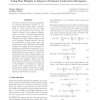20 search results - page 2 / 4 » The How and Why of Interactive Markov Chains |
ICML
2009
IEEE
13 years 11 months ago
2009
IEEE
The most commonly used learning algorithm for restricted Boltzmann machines is contrastive divergence which starts a Markov chain at a data point and runs the chain for only a few...
CONCUR
2009
Springer
13 years 11 months ago
2009
Springer
We propose how to present and compute a counterexample in probabilistic LTL model checking for discrete-time Markov chains. In qualitative probabilistic model checking, we present ...
ECCV
2004
Springer
14 years 6 months ago
2004
Springer
Abstract. We describe a Markov chain Monte Carlo based particle filter that effectively deals with interacting targets, i.e., targets that are influenced by the proximity and/or be...
QEST
2007
IEEE
13 years 11 months ago
2007
IEEE
We consider a model for interacting objects, where the evolution of each object is given by a finite state Markov chain, whose transition matrix depends on the present and the pa...
CHI
2009
ACM
13 years 5 months ago
2009
ACM
In this paper, we propose a model to predict the performance of selection techniques using Brain-Computer Interfaces based on P300 signals. This model is based on Markov theory an...

